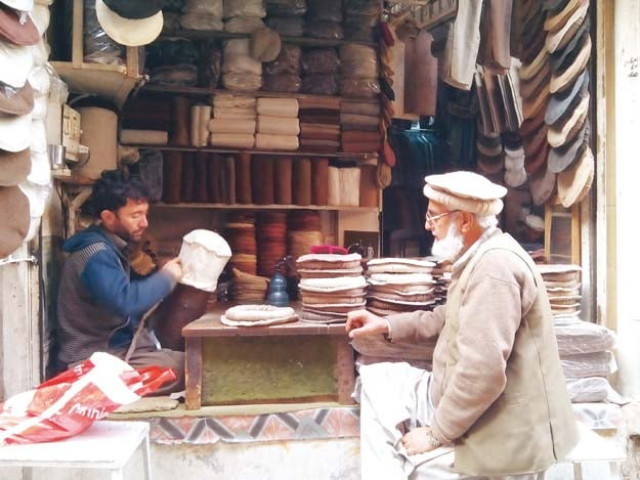Chitrali Pakol a popular choice for cold nights
Woollen caps preferred choice for residents of twin cities, foreigners

A shopkeeper gives final touches to a pakol. PHOTOS : ABDUR RAZZAQ
The handmade sheep wool caps are a winter staple in the northern areas with its different formats found from Chitral in the North West to Hunza in the North East.
Their ability to keep the head — the most important part of the body — warm means that it remains in great demand in the twin cities especially during the cold winter months. Such is the demand that making of the Chitrali Pakol has become an industry in itself in Chitral where women wash sheep wool strands and then turn them into threads using manual and mechanized machines. Later, the threads are weaved into a cloth called ‘Patti’ using manual weaving looms.
This cloth is also used to stitching a number of apparels such as the Chitrali cap coat and a traditional chogha (long coat) and shawls for women.
Despite the distance, the Chitrali caps are easily available in the markets of twin cities including at Jinnah Super Market, Sector F-10 Market, Abpara Market, Bank Road, and Adamjee Road in Scheme 3. The traditional cap is available in a variety of earthen colours such as brown, black, grey, or ivory. Some are dyed red using walnut extracts.
These caps are available for the meagre price of Rs300 to Rs1,000.
Sheikh Sohail, a local trader, said that the traditional cap was highly effective in keeping the wearer warm during the cold winters. He added that not only is the traditional cap popular amongst locals, but visitors from abroad also purchase these caps, often in bulk quantity.
He said that apart from the cap, traders from Chitral also bring in the Chitrali waistcoat or the Chogha for sale in the market along with stocks of Chitrali Patti — which was in high demand in the market.
Sohail further said that owing to its association with a particular area, the cap had gained a political significance as well and had gained significance amongst the youth as a fashion symbol.
Some people who bought the caps said that they usually purchase them at the beginning of the winter season. Apart from updating their own headgear, they said that they also gift it to their relatives and friends on different occasions.
They added that the machine-woven caps were easily available in different markets across the country at low prices. However, caps made from manually weaved cloth of high quality was rare and quite expensive with the latter incomparable in quality.
To ensure that the cap industry remains sustainable, they demanded that the government work to provide financial and other assistance to those associated with this industry apart from helping secure modern machinery for them because the manual methods were time-consuming and expensive. This way, they argued, the government could not only help promote this cottage industry but also create a myriad of job opportunities, especially amongst the youth and indirectly promote tourism.
Published in The Express Tribune, March 18th, 2019.



















COMMENTS
Comments are moderated and generally will be posted if they are on-topic and not abusive.
For more information, please see our Comments FAQ